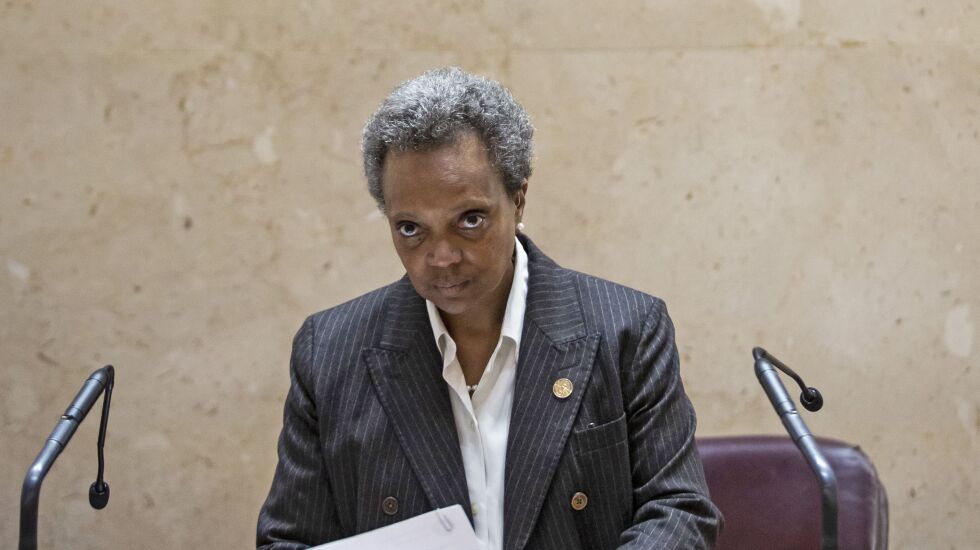
Mayor Lori Lightfoot’s penchant for getting around City Council oversight by introducing legislation directly to committee under the guise of “emergency” could come to a screeching halt — under a crackdown proposed in the name of transparency.
Armed with endorsements from the Better Government Association and the League of Women Voters of Chicago, Ald. Brendan Reilly (42nd) —who doubles as vice-mayor— urged the Rules Committee Tuesday to modify Rule 41 of Robert’s Rules of Order to level a playing field Reilly believes is now tilted in the mayor’s favor.
“If you’re about bringing in the light, this ordinance is for you,” Reilly told his colleagues, invoking a reference to Lightfoot’s 2019 campaign slogan.
“The two biggest good government groups in the city who are all about transparency strongly support this ordinance. And there’s only one entity that’s opposed. That entity resides on the 5th floor of City Hall.”
The changes would require any item directly introduced to committee to be publicly posted and forwarded to alderpersons at least 48 hours before a committee hearing, along with an “unbiased summary” of the legislation and a “statement explaining the urgency.”
No more would a “vague description” on the committee agenda suffice, leaving interested parties and everyday Chicagoans unable to find the legislation on the city clerk’s website and read it before the committee votes.
The 48-hour advance warning also would allow alderpersons to educate themselves before determining whether to support or reject the mayor’s “emergency” requests.
The proposal would prohibit direct introduction of matters when “substantially similar” legislation has already been referred to the same committee, or “any other” City Council committee.
Reilly said the goal is to “bring more transparency to the legislative process by closing a loophole in our City Council rules that holds members of the City Council to one standard for direct introductions” while “a much looser standard” applies to the mayor.
“This is meant to give us a chance as a legislative body to determine when items are urgent ... and need to be considered right away. As it stands today, the administration and previous administrations blow right past that checkpoint and are consistently introducing last-minute ordinances to committee when very few people, especially the public, have an opportunity to review these changes,” Reilly said.
Bryan Esenberg, managing deputy of the Chicago Department of Housing, countered that direct introductions are used “only when absolutely necessary due to issues such as changes in marketing conditions, expiring resources and a response to critical needs.”
“Developers call us just like they call you and any time the market shifts, they push for ways to save time on closing so they can lock in rates on loans and lock in rates on debt,” Esenberg told the Rules Committee.
“Often saving time, frankly, means saving additional resources the city needs to put into a deal, which is something that we all want.”
Planning and Development Commissioner Maurice Cox cited “significant budget increases” in the cost of redeveloping the Ramova Theater in Bridgeport.
“Additional city dollars were needed. The city agreed to those additional dollars. But, it had to be done in a fashion that would release them immediately,” Cox said.
“If we had not acted, the project would have come to a full stop. ... The prices would have gone further up and we would have had to come back and ask for additional dollars from City Council.”
Ald. Jason Ervin (28th), one of Lightfoot’s staunchest Council supporters, questioned why the change is being made just months before the mayoral election.
“I don’t want to go into the weeds of other issues that may be racist or sexist. But I do believe the why of this, the timing of this” is suspect, Ervin said, suggesting the rule change be punted to the next Council.
Reilly stood his ground.
“Colleagues, this is good for the City Council. We’re legislators. This is our body. Let’s take care of our body and do right by the public. That’s all I’m asking,” he said.
Jane Ruby, president of the League of Women Voters of Chicago, sent a letter urging alderpersons to adopt the changes, calling it a “significant step in providing more transparency” that should “result in better government for the people of Chicago.”
Bryan Zarou, director of policy for the Better Government Association, similarly argued Reilly’s crackdown would “prevent items from being called for a committee vote before the public can read and comment on” the language.
Normally, legislation sponsored by the mayor, alderperson or member of the general public is introduced at a City Council meeting and referred to committee for a hearing. Prior to that hearing, the text of the legislation is posted on the clerk’s website to give alderpersons and the public an opportunity to educate themselves and weigh in prior to a committee vote.
A direct introduction bypasses that step completely and, too often, leaves the public and their elected representatives in the dark.
It’s the latest sign of Lightfoot’s contentious relationship with the Council.
Last month, Ald. Matt Martin (47th) introduced a resolution calling for promoting himself from vice chairman of the Committee on Ethics and Government Oversight to chairman, replacing the now-retired Ald. Michele Smith (43rd).
Lightfoot responded: “The process is the mayor makes the final picks,” adding that she sees “no reason to break from that long-standing precedent.”
The BGA has urged the Council to declare its independence from Lightfoot. So has former Inspector General Joe Ferguson, who branded Chicago the “only major city in the United States” allowing its mayor to dictate committee chairs.
Ald. Anthony Beale (9th), one of the mayor’s most outspoken Council critics, has gone even further, arguing the Council needs to be “turned upside down” — with its own speaker, parliamentarian and attorney and committee chairs it chooses — to end Lightfoot’s “dictatorship.”







